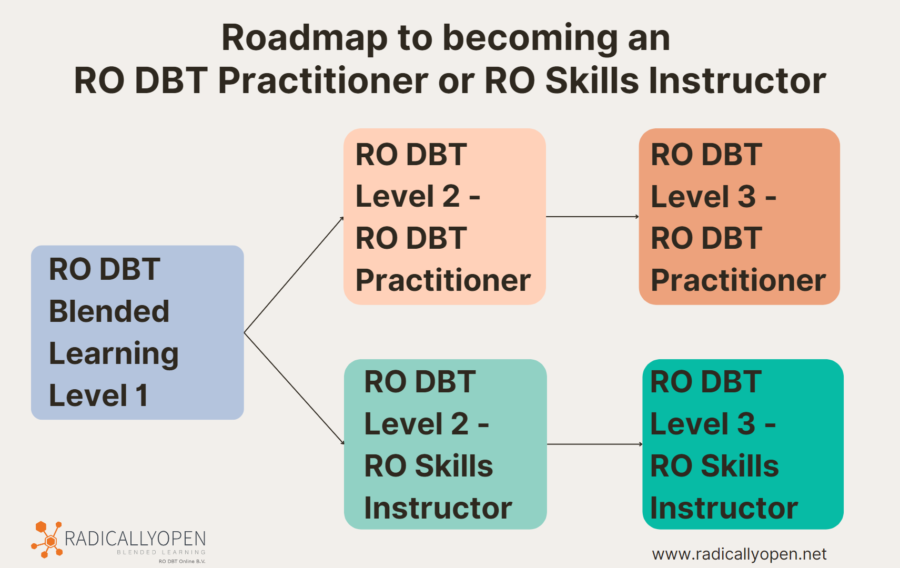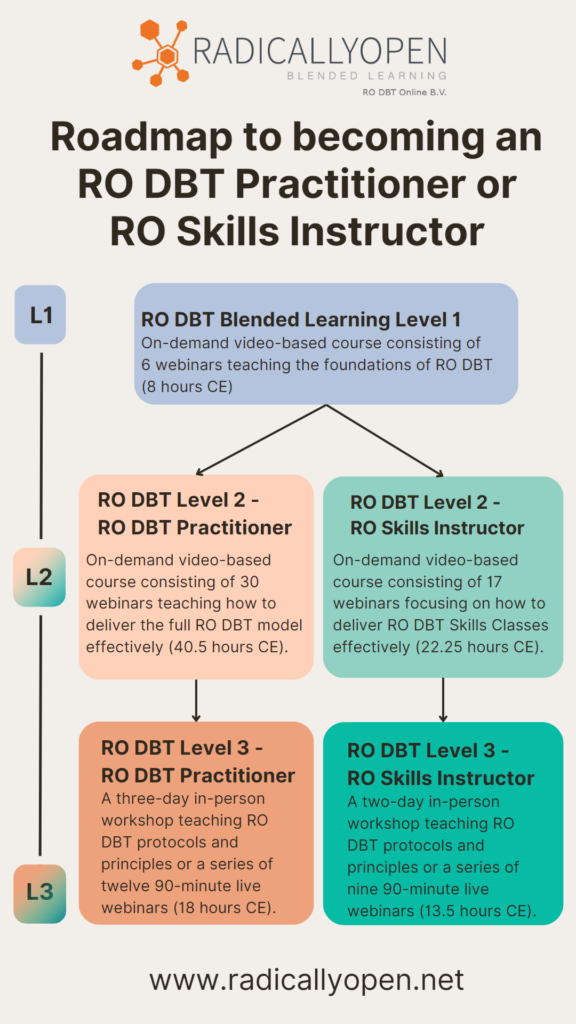Roadmap to becoming an RO DBT Practitioner or RO Skills Instructor

If you have been following us for a while, you know we are constantly developing our RO DBT training materials and programs, as well as the way in which these are delivered via our -new- website and in-person workshops.
One of these developments is the new RO Skills Instructors Pathway: a slimmed-down version of the RO DBT Practitioner pathway designed for clinicians who only wish to lead or co-lead RO Skills Classes.
Most of the research on RO DBT has been based on the out-patient model, a combination of individual treatment sessions and RO skills training classes, where possible supplemented with phone or text coaching and team consult meetings. However, we recognize this set-up is not always possible due to budget, organizational or staff limitations, and there is emerging research that shows that a transdiagnostic skills class only approach is also effective (Keogh et al., 2016). We have therefore created the Skills Instructor pathway to offer clinics a more affordable option to get staff trained up adherently, at a lower intensity and price than the full RO DBT Practitioner training.
Who should do the RO Skills Instructor pathway?
The pathway is designed for clinicians or clinical support staff who only wish to lead or co-lead RO skills training classes, where possible alongside one or more fully trained RO DBT Practitioners who offer individual treatment sessions. It can be a way to build a more robust RO DBT team to ensure continuity of skills training classes as well as a means to help junior staff or students familiarize themselves with the treatment.
How is the RO Skills Instructor Pathway different from the ‘full’ RO DBT Practitioner Pathway?

We have created a visual presentation of the roadmap to becoming an RO DBT Practitioner or Skills Instructor to show you the differences between the two pathways.
Everyone, regardless of the chosen pathway, completes the Level 1 training, consisting of 6 on-demand webinars covering 8 hours of teaching.
After this, the pathway splits into Level 2 for RO DBT Practitioner and Level 2 for RO Skills Instructors. RO DBT Practitioners complete 30 on-demand webinars divided across twelve parts, covering just over 40 hours of teaching, whereas RO Skills Instructors complete 17 webinars divided across seven parts, covering just over 22 hours of teaching.
Below is a list of all Level 2 parts: RO DBT Practitioners complete all twelve parts, whereas RO Skills Instructors complete parts 1-6, 9 and 10. The topics in orange below are completed by both RO Skills Instructors and RO DBT Practitioners
- Part 1: Radical Openness & Self-Enquiry
- Part 2: Effective Treatment Structuring
- Part 3: The Key Mechanism of Change
- Part 4: Therapeutic Use of Social Signaling
- Part 5: Therapeutic Stance, Teasing and Silliness
- Part 6: Skills Training in Radically Open Dialectical Behavior Therapy
- Part 7: Treating the Enigma Predicament (RO DBT Practitioner Pathway only)
- Part 8: Treating Secret Moral Emotions (RO DBT Practitioner Pathway only)
- Part 9: Alliance Ruptures and Repairs
- Part 10: Dealing with Disguised Demands
- Part 11: Effective Treatment Targeting (RO DBT Practitioner Pathway only)
- Part 12: Chain & Solution Analysis (RO DBT Practitioner Pathway only)
Once both Level 1 and 2 have been completed, it’s time for Level 3, the in-person part of this Blended Learning program. The goal of Level 3 is to consolidate your learning from Levels 1 and 2, to deepen your knowledge and to practice, practice, practice! We highly recommend attendance at an in person Level 3 workshop, but if this is not possible, attendance at an online meeting series will also provide you with a completion certificate.
RO DBT Practitioners attend all three days of the workshop or twelve online sessions of this training, covering 18 hours of teaching, whereas RO Skills Instructors attend only the first two days of the workshop or the first nine meetings of the online meeting series, covering 13.5 hours of teaching.
Level 3 is very interactive via practical exercises and role-plays so full audience participation is expected. Level 3 will cover the following topics, with the topics in orange completed by both RO Skills Instructors as well as RO DBT Practitioners:
- Self-Enquiry
- Orientation and Commitment
- Disguised Demands
- OC Subtypes
- Teasing
- Alliance Ruptures & Repairs
- RO Skills Class
- Managing Maladaptive Behavior in class
- Targeting (RO DBT Practitioner Pathway only)
- Chain Analysis (RO DBT Practitioner Pathway only)
- Solution Analysis (RO DBT Practitioner Pathway only)
- Micro-Supervision (RO DBT Practitioner Pathway only)
What’s the difference in pricing?
You can choose to start with Level 1 before making any decisions on which pathway to pursue, followed by the Level 2 of your choice.
- Level 1 is $249.99
- Level 2 for RO DBT Practitioners is $1000
- Level 2 for RO Skills Instructors is $550
However, if you already know which pathway you want to do, a package deal for Levels 1 and 2 is the more economical option.
- The Level 1 and 2 Package Deal for RO Skills Instructors is $700
- The Level 1 and 2 Package Deal for RO DBT Practitioners is $1100
Finally, Level 3. The pricing is the same regardless of in-person or online training. We strongly encourage in-person training although we recognize this is not always possible.
- Level 3 for RO Skills Instructors is $600
- Level 3 for RO DBT Practitioners is $900
All our training events and package deals for our therapist training can be found here: https://www.radicallyopen.net/training/therapist-training/
We hope to see you at one of our trainings soon! In the meantime, if you have any questions, feel free to email us: support@radicallyopen.net